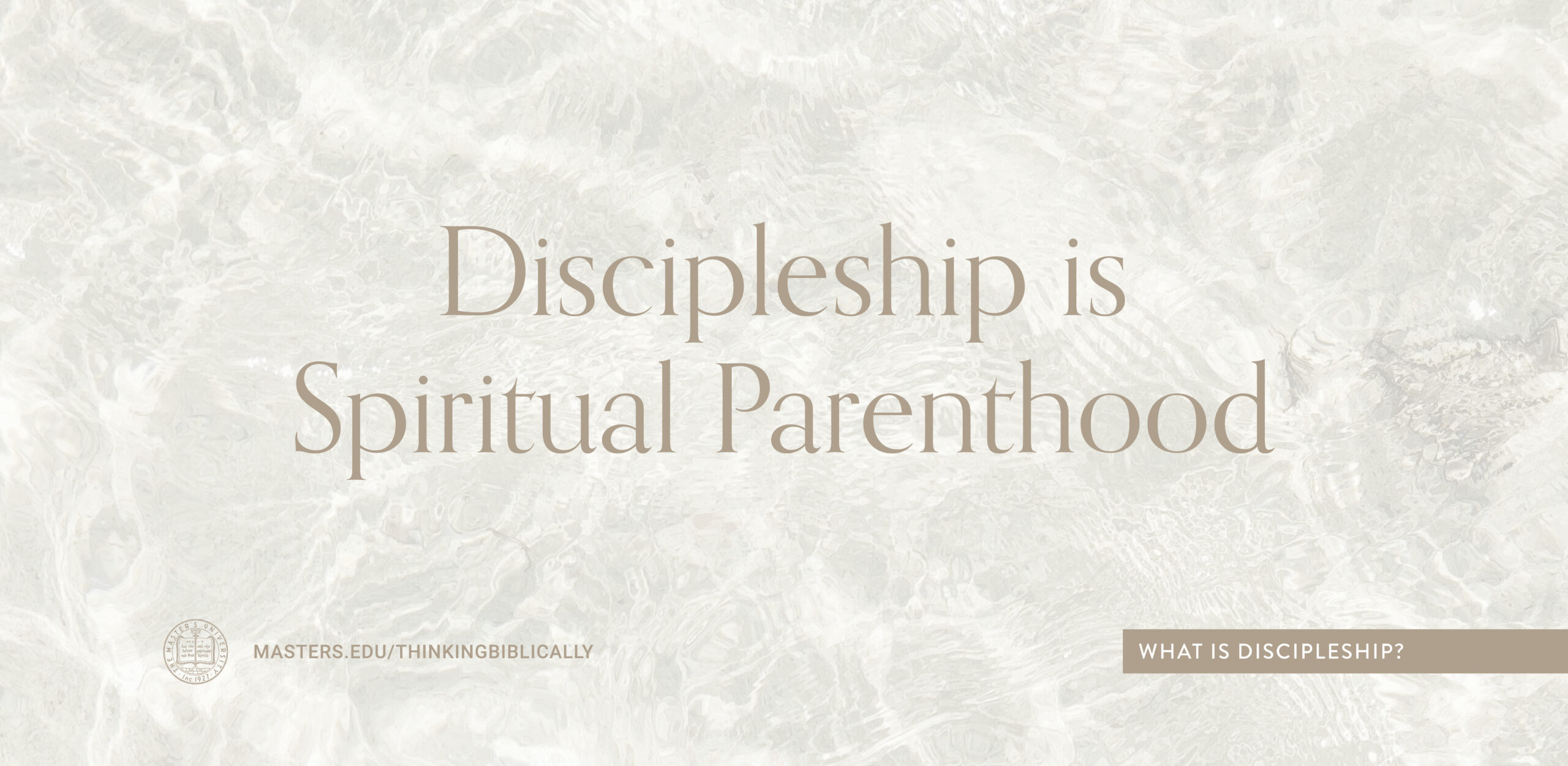
At The Master’s University, we are committed to discipleship, from the administration, staff, and faculty on down to students. But what exactly does discipleship involve?
The Greek word for disciple is mathētēs, which means “learner.” A disciple, then, is one person who learns from another.
This sort of teaching isn’t just didactic. In fact, I have often said that the best way to define discipleship is this: It is a deep friendship with a spiritual core. As a discipler, you come alongside someone not simply to instruct them, but to pass on your life patterns to them. This goes beyond just disseminating information. It involves teaching them how to live a godly life. It involves walking with them through the world and the daily struggles of life.
I believe that 1 Corinthians 4:14-21 gives us a good model of what this sort of discipleship looks like. In this letter, Paul is writing to the Corinthians, who were his disciples in every sense. And in this passage specifically, we can find six ingredients that characterized Paul’s relationship with the Corinthians. I want to give you these six for your own thinking, because I believe they will give us a framework for understanding discipleship in our own lives.
Let me share the first of these ingredients today.
I do not write these things to shame you, but to admonish you as my beloved children. For if you were to have countless tutors in Christ, yet you would not have many fathers, for in Christ Jesus I became your father through the gospel. (1 Corinthians 4:14-15)
Paul cared greatly for the Corinthians. He spent 18 months of his life in the city of Corinth. He wrote them at least three letters, two of them inspired. He was intimately involved in the process of nurturing them as his disciples. But it all began when he begot them by bringing the gospel of Christ to them.
If you have been faithful to communicate Christ to someone and had the privilege of leading them to the Lord, then you have become their spiritual father. And even if they have 10,000 people who care about their spiritual welfare, they will still only have the one spiritual father. That bond is like no other bond.
I can tell you this from personal experience. The people that I have had the privilege of leading to Christ have a very different relationship to me than other people, because they see me as a special instrument of God in their life. When a discipleship relationship begins with one person leading the other to Christ, it creates a unique sense of fulfillment and joy.
Am I saying that you should never disciple somebody you didn’t personally lead to Christ? Certainly not. The problem is that a lot of people don’t have access to the person who was instrumental in bringing the gospel to them. Maybe the person moved away. Maybe God used a book or a radio program instead of someone they knew. Or maybe someone led them to Christ and wasn’t faithful about following up with them. The world is full of new babes in Christ who are lying around kicking and screaming, pleading for somebody to feed them. And someone needs to be a surrogate parent to these people.
Even still, discipleship is purest and most fulfilling when you have been the spiritual father in the relationship. If we are to be true disciplers, then, we have to be true evangelists. But of course, evangelism is just the beginning of the process. Next time I’ll be talking about the second ingredient of effective discipleship: warning your disciple about the dangers of sin.

The Master’s University and Seminary admit students of any race, color, national and ethnic origin to all the rights, privileges, programs, and activities generally accorded or made available to students at the school. It does not discriminate on the basis of race, color, national and ethnic origin in the administration of its educational policies, admissions policies, scholarship and loan programs, and athletic and other school-administered programs.
21726 Placerita Canyon Road
Santa Clarita, CA 91321
1-800-568-6248
© 2025 The Master’s University Privacy Policy Copyright Info
| Cookie | Duration | Description |
|---|---|---|
| cookielawinfo-checkbox-analytics | 11 months | This cookie is set by GDPR Cookie Consent plugin. The cookie is used to store the user consent for the cookies in the category "Analytics". |
| cookielawinfo-checkbox-functional | 11 months | The cookie is set by GDPR cookie consent to record the user consent for the cookies in the category "Functional". |
| cookielawinfo-checkbox-necessary | 11 months | This cookie is set by GDPR Cookie Consent plugin. The cookies is used to store the user consent for the cookies in the category "Necessary". |
| cookielawinfo-checkbox-others | 11 months | This cookie is set by GDPR Cookie Consent plugin. The cookie is used to store the user consent for the cookies in the category "Other. |
| cookielawinfo-checkbox-performance | 11 months | This cookie is set by GDPR Cookie Consent plugin. The cookie is used to store the user consent for the cookies in the category "Performance". |
| viewed_cookie_policy | 11 months | The cookie is set by the GDPR Cookie Consent plugin and is used to store whether or not user has consented to the use of cookies. It does not store any personal data. |
Notifications